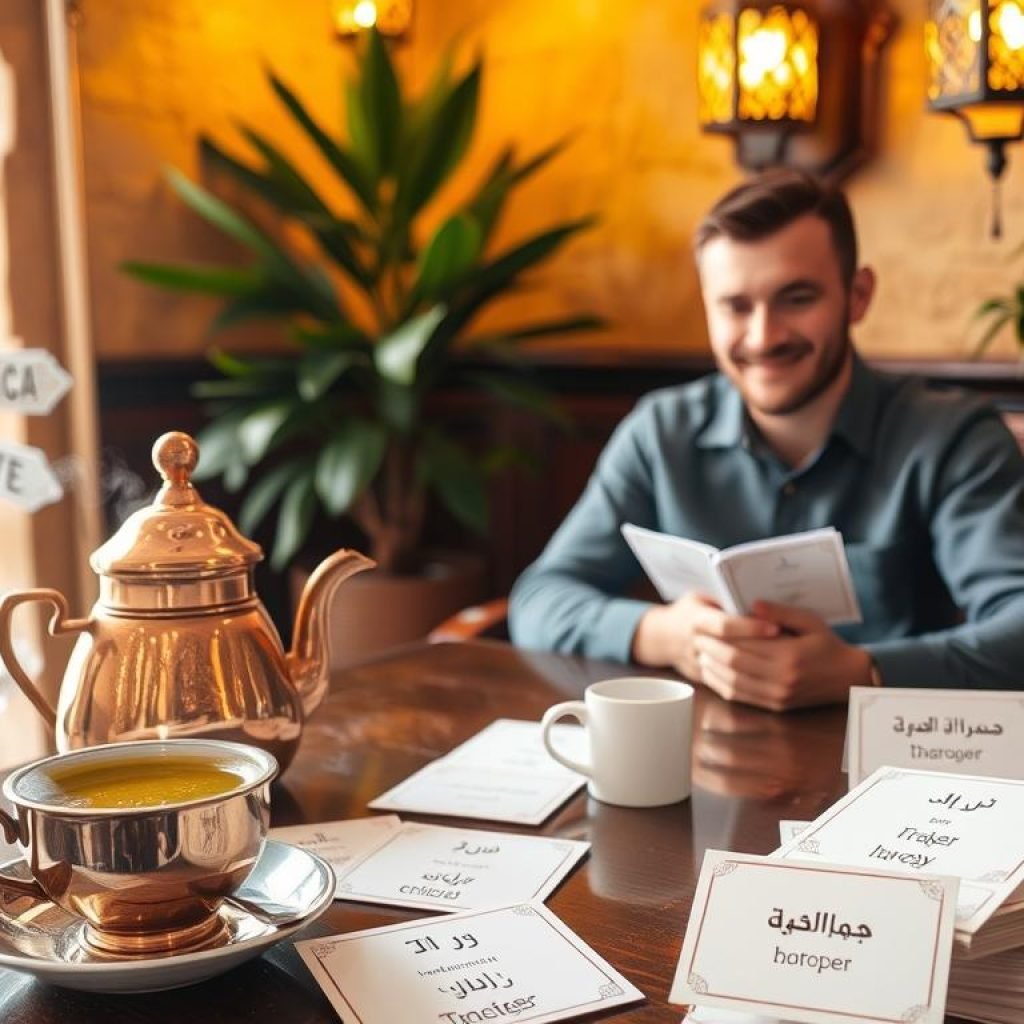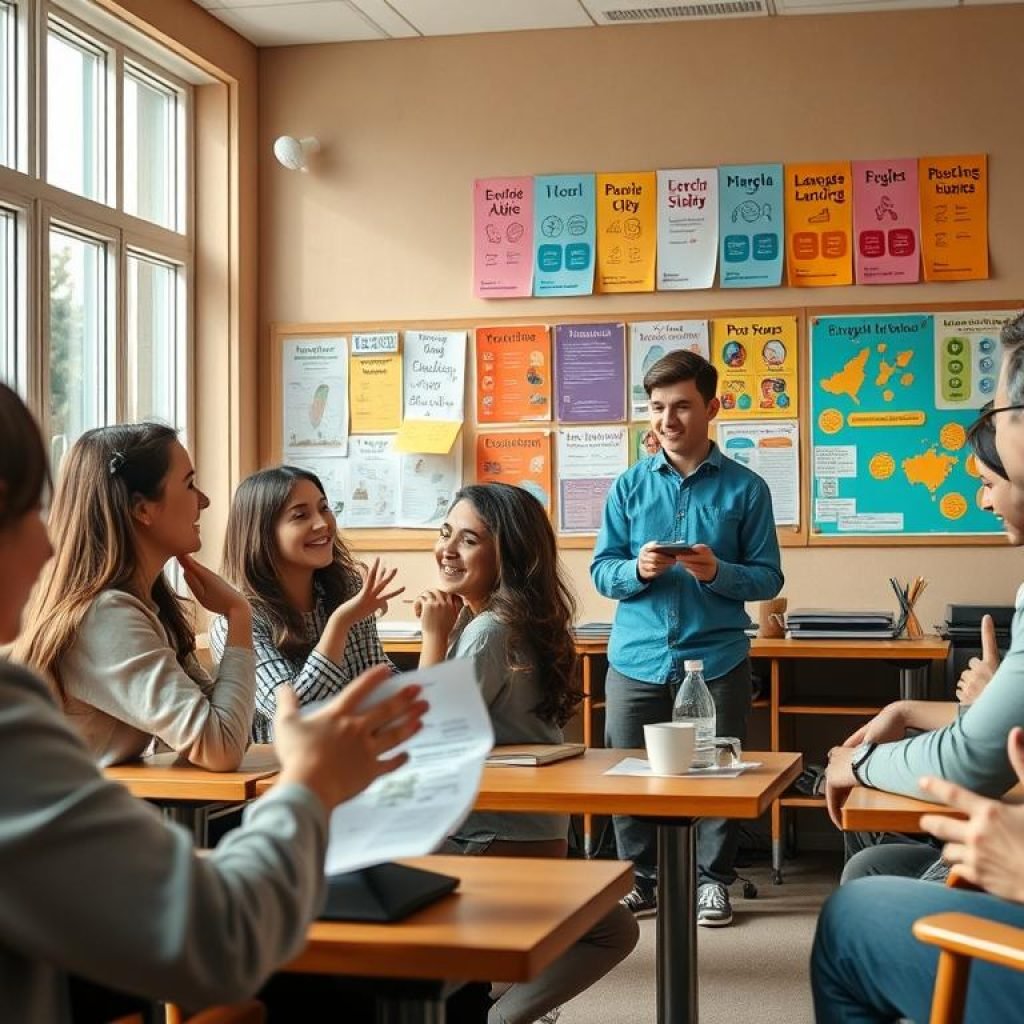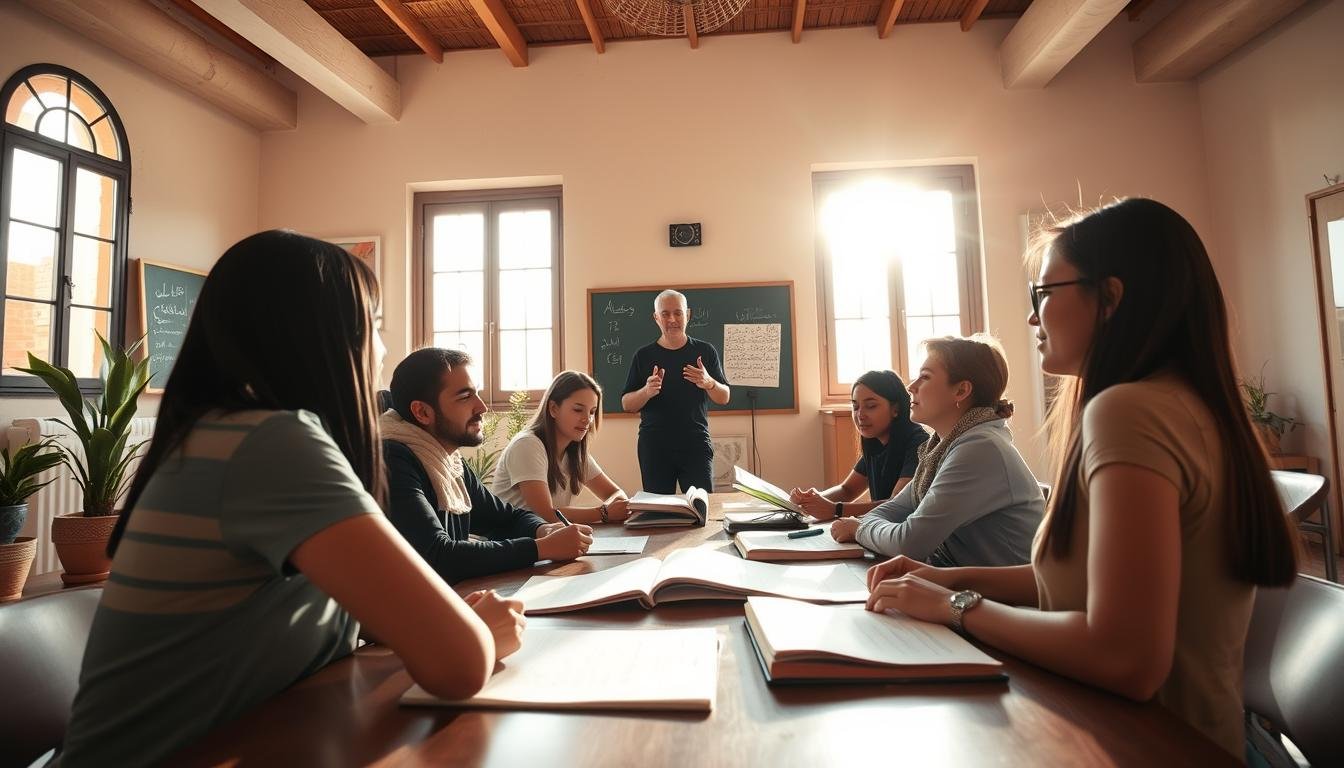Stepping into Morocco can feel like entering a vibrant tapestry of cultures, sounds, and traditions. Yet, for many travelers and expats, the excitement is often met with the challenge of communication. Whether you’re navigating bustling souks or ordering a meal, understanding the local Moroccan Arabic can make all the difference.
While French and Spanish are widely spoken in certain regions, Moroccan Arabic (Darijah) is the heart of daily interactions. Learning a few basic phrases not only helps you get by but also opens doors to deeper connections with locals. This guide is designed to help you overcome these barriers with practical strategies and cultural insights.
From essential vocabulary to immersive learning techniques, you’ll discover how to navigate Morocco with confidence. Whether you’re planning a short visit or a long-term stay, this article will equip you with the tools to communicate effectively and embrace the rich culture of this fascinating country.
Key Takeaways
- Mastering basic Moroccan Arabic phrases enhances daily interactions.
- Immersion is one of the most effective ways to learn the local dialect.
- French and Spanish are useful in specific regions but not universally spoken.
- Cultural understanding is key to overcoming communication challenges.
- Modern tools like apps and online resources can support your learning journey.
Understanding Language Barriers in Morocco
Navigating Morocco’s vibrant streets often brings excitement, but communication hurdles can arise. A language barrier in this context refers to the difficulty visitors and residents face when trying to communicate effectively. This is due to the unique blend of Moroccan Arabic, French, Berber, and even Spanish, which creates a complex linguistic environment.
Common Communication Challenges
One of the most frequent issues is the fast-paced nature of conversations. Locals often speak quickly, using colloquial words and expressions that differ from classical Arabic. This can make it hard for newcomers to follow along. Additionally, the mix of dialects and languages can be overwhelming. For example, a simple conversation might switch between Moroccan Arabic, French, and Berber seamlessly.
Another challenge is the use of non-standard phrases. Many people in Morocco use informal terms that aren’t taught in traditional language courses. This can lead to misunderstandings, especially in everyday situations like ordering food or asking for directions.
Impact on Daily Interactions
These communication issues can interfere with daily activities. For instance, shopping in bustling souks or negotiating prices becomes harder when you can’t understand the seller. Similarly, asking for help or directions can be frustrating if you’re unfamiliar with the local dialect.
The blend of languages also means that relying solely on French or Spanish isn’t always effective. While these languages are useful in certain regions, they aren’t universally spoken. This highlights the importance of learning basic Moroccan Arabic to navigate daily life more smoothly.
Understanding these challenges is the first step toward overcoming them. In the next sections, we’ll explore practical strategies to help you communicate effectively and embrace Morocco’s rich culture.
Language tips for Morocco: Essential Communication Strategies
Mastering a few key phrases in Darija can transform your experience in Morocco. Whether you’re greeting locals or navigating daily tasks, these basics will help you connect more deeply with the culture.

Learning Basic Darija Phrases
Start with simple greetings like “Salam” (hello) and “Shukran” (thank you). These phrases are essential for polite interactions. For example, asking “Labas?” (How are you?) shows interest in the person you’re speaking to.
Common expressions like “Mashi Mushkil” (No problem) and “Afak” (please) are also useful. They demonstrate respect and help you navigate everyday situations with ease.
Practical Vocabulary for Everyday Use
Building a core vocabulary is crucial. Learn numbers like “Wahed” (1) and “Juj” (2) for shopping or transportation. Phrases like “Fin kayn…” (Where is…) and “Yemken Takhodni l…?” (Can you take me to…?) are practical for getting around.
Memorizing new words is easier with repetition. Write them down, use flashcards, or practice with apps. Regular practice ensures these words become second nature.
Online resources like videos and audio lessons can also help. They provide real-life examples of how Darija is spoken, making it easier to understand and use in context.
Building Your Moroccan Arabic Foundation
Building a strong foundation in Moroccan Arabic is essential for meaningful interactions. Starting with the basics helps you navigate daily life and connect with locals on a deeper level. Whether you’re greeting someone or asking for directions, mastering these fundamentals will make your experience smoother and more enjoyable.
https://www.youtube.com/watch?v=Noa3Cg0N52E
Greetings and Introductions
Greetings are the cornerstone of communication in Morocco. Begin with “As-salaam Alaykum” (Peace be upon you), a universal greeting that shows respect. Follow up with “Labas?” (How are you?) to engage in friendly conversation. These phrases are simple but powerful, demonstrating your willingness to connect.
Introductions are equally important. Use “Ismi…” (My name is…) to share your name and “Shukran” (Thank you) to express gratitude. These basics will help you build rapport with native speakers and create a positive first impression.
Useful Expressions in Darija
Learning practical expressions can make daily interactions easier. For example, “Afak” (Please) is a polite way to make requests, while “Mashi Mushkil” (No problem) shows understanding and flexibility. These phrases are versatile and can be used in various contexts.
Here are a few more expressions to add to your vocabulary:
- “Fin kayn…?” (Where is…?) – Perfect for asking directions.
- “Yemken Takhodni l…?” (Can you take me to…?) – Useful for transportation.
- “Bshal?” (How much?) – Essential for shopping and bargaining.
Practicing these phrases with native speakers will refine your pronunciation and boost your confidence. Additionally, understanding both English and Arabic equivalents can make the learning process smoother.
“Language is the road map of a culture. It tells you where its people come from and where they are going.”
By focusing on these essentials, you’ll establish a solid foundation in Moroccan Arabic. This will not only help you overcome communication barriers but also enrich your cultural experience in Morocco.
Effective Methods to Learn Moroccan Arabic Fast
Mastering Moroccan Arabic quickly is achievable with the right strategies. While the dialect may seem challenging, focused techniques can help you build new language skills efficiently. Here’s how to accelerate your learning journey.
Short, consistent study sessions are more effective than infrequent cramming. Dedicate 30 minutes daily to practice. This approach helps reinforce language learning and ensures steady progress. Use tools like flashcards or apps to make the most of your time.

Technology plays a key role in modern language learning. Apps and online courses offer structured lessons tailored to Moroccan Arabic. Platforms like YouTube and podcasts provide real-life examples, making it easier to understand pronunciation and context.
Targeted practice is essential. Focus on practical phrases and vocabulary you’ll use daily. For example, learn greetings, numbers, and common expressions. This way learn ensures you’re prepared for real-world interactions.
Set manageable goals to stay motivated. Break your learning into smaller milestones, like mastering 10 new words weekly. Celebrate progress to maintain enthusiasm. Incremental learning builds confidence and keeps you on track.
Finally, immerse yourself in the new language. Listen to Moroccan music, watch movies with subtitles, or practice with native speakers. These activities make learning engaging and fun while enhancing retention.
By combining these methods, you’ll find a way learn Moroccan Arabic that fits your lifestyle. With dedication and the right tools, fluency is within reach.
Leveraging Immersion and Native Resources
Immersing yourself in Moroccan culture is one of the most effective ways to master the local dialect. By surrounding yourself with native speakers and engaging in daily conversations, you can accelerate your learning process. This approach not only improves your language skills but also deepens your understanding of the culture.
Online Platforms and Mobile Apps
Technology has made it easier than ever to learn Moroccan Arabic. Platforms like Italki and YouTube channels offer structured lessons and interactive content. These resources provide real-life examples, helping you grasp pronunciation and context more effectively.
Mobile apps like Duolingo and Memrise are also valuable tools. They allow you to practice on the go, making it convenient to dedicate time to learning. These apps often include gamified elements, keeping you motivated and engaged.
Language Exchange Opportunities
Language exchange programs are another excellent way to practice. Whether in person or virtual, these opportunities connect you with native speakers who are eager to learn your language. This mutual exchange fosters meaningful connections and enhances your learning experience.
For those planning travel Morocco, integrating language practice into your trip is highly beneficial. Engage with locals, participate in cultural activities, and use every opportunity to speak the dialect. This hands-on approach ensures rapid progress and better retention.
By combining immersion with modern tools, you can master Moroccan Arabic more efficiently. Whether through online platforms or real-life interactions, these strategies will help you navigate Morocco travel with confidence. For more insights on educational strategies, explore strategies for higher education success.
Mastering Essential Vocabulary and Sentences
Exploring Morocco’s rich culture requires more than just curiosity—it demands communication. To navigate daily life confidently, mastering essential words and phrases is crucial. Whether you’re ordering food, asking for directions, or shopping in bustling souks, a solid vocabulary foundation makes all the difference.
Travel and Daily Life Terminology
Start with practical terms for travel and daily activities. For example, “Fin kayn…?” (Where is…?) is invaluable for finding your way. Phrases like “Bshal?” (How much?) are essential for shopping and bargaining. Learning numbers, such as “Wahed” (1) and “Juj” (2), helps with transactions and transportation.
Greetings like “Salam” (Hello) and “Shukran” (Thank you) are the building blocks of polite interactions. These simple words can open doors to deeper connections with locals.
Contextual Usage in Moroccan Settings
Understanding how to use these phrases in context is key. For instance, saying “Afak” (Please) when making a request shows respect. Similarly, “Mashi Mushkil” (No problem) conveys flexibility and understanding. These expressions are versatile and can be applied in various situations.
Here are a few more examples:
- “Yemken Takhodni l…?” (Can you take me to…?) – Useful for transportation.
- “Labas?” (How are you?) – A friendly way to start conversations.
- “Ismi…” (My name is…) – Essential for introductions.
Regular practice is the best way to retain these phrases. Use flashcards, apps, or a course to reinforce your learning. Daily repetition ensures these words become second nature, boosting your confidence in real-life situations.
By focusing on essential vocabulary and contextual usage, you’ll be better equipped to navigate Morocco with ease. Whether you’re traveling or living there, these skills will enhance your experience and deepen your connection to the culture.
Practical Exercises and Tips for Language Retention
Retaining a new dialect requires consistent effort and smart strategies. Whether you’re learning Moroccan Arabic for travel or daily life, practical exercises can make a lot of difference. These methods not only help you remember words but also ensure they become second nature over the years.
Repetition and Recording Techniques
Repetition is one of the most effective ways to retain vocabulary. For example, practicing a word like “afak” (please) daily ensures it sticks in your memory. Recording yourself saying phrases and listening back can also help improve pronunciation and recall.
Building a personal library of audio notes is another great strategy. Record new phrases and review them regularly. This method allows you to hear your progress and identify areas for improvement. Over time, these recordings become a valuable resource for everyone learning the dialect.

Engaging Real-Life Practice Methods
Integrating language practice into daily activities is key. For instance, label things around your home with their Moroccan Arabic names. This visual reinforcement helps you associate words with objects, making them easier to remember.
Engage in conversations with native speakers whenever possible. Even simple exchanges, like using “afak” to make a request, can boost your confidence. The more you practice in real-life settings, the more natural the dialect will feel.
Here’s a table summarizing effective retention techniques:
| Technique | Description |
|---|---|
| Daily Repetition | Practice new words and phrases every day to reinforce memory. |
| Audio Recording | Record yourself speaking and listen for improvement. |
| Real-Life Practice | Use the dialect in everyday conversations and activities. |
Consistency is crucial. Dedicate a lot of time to these exercises, and you’ll see significant progress. Remember, everyone learns differently, so experiment with techniques to find what works best for you.
For deeper cultural insights, explore Moroccan proverbs, which reflect the country’s rich heritage and values. Understanding these sayings can enhance your appreciation of the dialect and its context.
Conclusion
Exploring the vibrant streets of Morocco becomes easier when you embrace its linguistic richness. By mastering basic phrases, you can navigate daily interactions with confidence, whether you’re ordering at a restaurant or checking into a hotel. Consistent practice and immersive experiences are key to overcoming communication barriers and connecting with locals.
Planning your trip with resources like phrasebooks or online courses can enhance your stay. These tools not only prepare you for practical situations but also deepen your cultural understanding. From bustling markets to serene landscapes, your journey will be enriched by the ability to communicate effectively.
Capture the beauty of Morocco through its photos and stories, and let your language skills open doors to unforgettable experiences. Start learning today and make your next adventure smoother and more meaningful.




Comment (0)